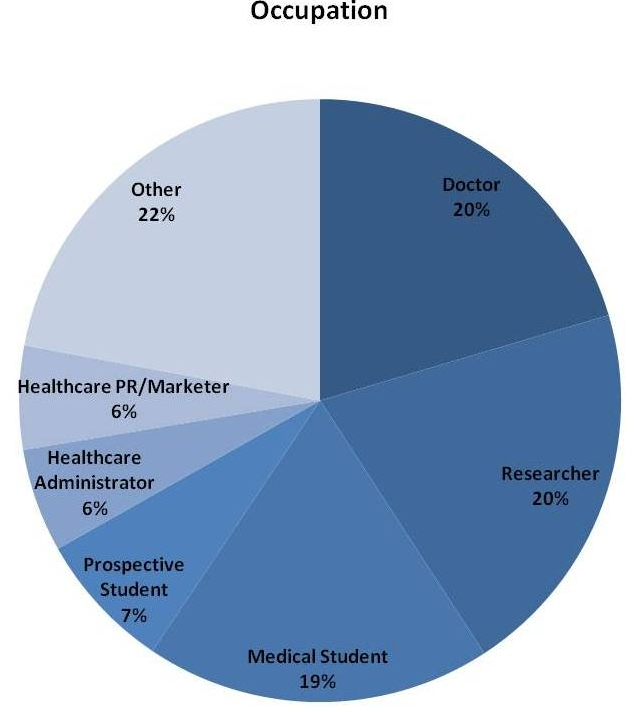Well…we asked for your opinion on The Doctor’s Tablet and, boy, did we get an earful!

Ali Ezzati, won $60 in Starbucks gift cards after filling out our blog survey. He hasn't slept in days!
A hearty thanks to the 50 people who responded to our online survey about their interest level in this blog and suggestions for making it better.
As anyone who has started a blog knows, what your audience really thinks is a bit of a black box. Yes, we have Google Analytics, and we closely track engagement through Buffer, likes, shares, tweets and comments—but we knew we could benefit significantly from qualitative data to serve our audience better.
So, as The Doctor’s Tablet moves into its seventh month, here’s what you told us (thanks to our having enticed you with a chance to win one of two $60 Starbucks cards for filling out our survey.)
Hey, we know the draw of a good cup of joe!.
Who You Are
Through our survey, we learned that our intended audience is in fact the majority of our readers: Nearly 60% of respondents identified themselves as “doctors [20%], researchers [20%] or medical students [19%].”
Other prominent audience categories included prospective students, healthcare PR/marketers, and healthcare administrators (between 6% and 7% each). A smaller percentage identified themselves as engineers or project managers, public health professionals or speakers/trainers in healthcare social media.
Our audience is fairly evenly divided among those age 26 and under (33%) and those 26 to 35, 36 to 50, and over 51 (all 22%).
How You Connect
We were especially pleased to see that our social media following has extended to our blog audience. Forty-four percent of respondents told us they followed us on social media and became exposed to the blog through Twitter, Facebook, Google+, LinkedIn or our other social media platforms. Forty-two percent learned about the blog through our website.
Nearly 7 in 10 (67%) said they were either “very likely” (11%) or “somewhat likely” (56%) to share our content with others.
The Good: What You Like
Nearly eight out of ten blog subscribers told us they are most interested in personal stories and opinions or “hot” issues in the news.
More than half say they are interested in disease/condition-related stories.
Readers told us that our topics are timely, diverse, interesting and helpful. A sampling of comments:
“I pick up two or three facts every time I read it.”
“It’s a great way to connect and inform physicians.”
“As a pre-med student, I learn a lot about Einstein. I hope to apply there someday.”
“When I see an interesting comment, I tweet it.”
The (Not Really) Bad: How You Think We Can Do Better (and What We’re Doing About It)
Content:
Add posts from doctors in training (and younger writers). We heard you. Here’s a recent post reflecting on one Einstein graduate’s first year of residency.
Expand content on “innovative medical research. See the reaction post on an Alzheimer’s study in Nature.
Post more on the community. Recently added: a post on life expectancy in New York City.
About length: two people told us the posts are just right; another two said they are too long, and one said they are too short. (We will continue making our posts too long, just right and sometimes short.)
Design:
Reorganize layout into two or three columns so readers don’t have to scroll so much. We are considering a design change.
“Where’s the Einstein logo?” Look up, we’ve added the logo!
Promotion:
Better package the blog post in e-mails so readers can “get the gist” so they can make better decisions about whether to click on the full link. As our subscribers may have noticed, we’ve packaged the blog using a quote and short text. Subscribe to see what we mean!
Improve your headlines. We’re constantly working to make our headlines interesting but not misleading.
Make the blog easier to find on the Einstein website. We’ve added a large icon to the news portion of our website home page.
The Ugly: What You Strongly Dislike
We received one negative comment from an Einstein medical student about a February 2012 post in which we presented the viewpoint of a urologist who supported the PSA blood test after the U.S. Preventive Services Task Force (USPSTF) openly questioned its value in prostate cancer. While recognizing that our blog’s disclaimer states that viewpoints expressed on the blog are those of blog authors, not the institution, the student felt the pro-PSA viewpoint was counter to what the institution teaches.
We want to address this comment. First, the post states that it was our intention to present “two sides” of the PSA debate. The post was followed nine days later by a firm rebuttal criticizing the pro-PSA viewpoint as not “evidence-based.”
Both posts occurred about three months before the USPSTF issued guidelines against the PSA test for asymptomatic men. Perhaps we could have presented these blogs back to back. We will keep this in mind as we look to improve the blog. As editors of The Doctor’s Tablet, we take seriously any perception that we’re somehow pushing an agenda.
We see our role as helping to foster discussion and debate. We encourage opposing viewpoints provided they are well argued and not personal attacks. In the end, we leave it to you to decide the merits of those arguments.
Our Commitment to Readers:
At the risk of making this post “too long,” we want to thank sincerely all those who provided feedback. We continue to learn with every post and will carefully consider each of your suggestions. By all means, feel free to provide continued feedback by leaving a comment—that’s something we really like!


